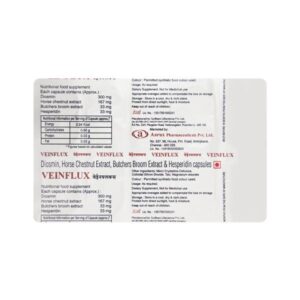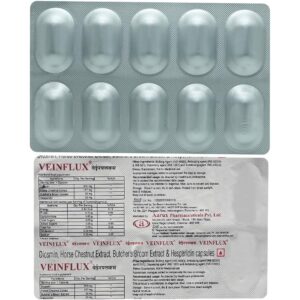DIOSMIN + HESPERIDIN + BUTCHERS BROOM EXTRACT + HORSE CHESTNUT EXTRACT
Diosmin: Diosmin is a medication that belongs to the class of drugs known as venotonics or phlebotropics. It is primarily used for the treatment of chronic venous insufficiency (CVI) and hemorrhoids.
Diosmin works by increasing the tone and strength of the walls of blood vessels, particularly in the veins. It also helps to improve circulation and reduce inflammation. This mechanism of action helps to alleviate the symptoms associated with CVI, such as leg pain, swelling, and heaviness, as well as symptoms of hemorrhoids, like anal bleeding and discomfort.
The typical recommended dose of diosmin for the treatment of chronic venous insufficiency is 500 mg to 1000 mg per day, taken in divided doses. For the treatment of hemorrhoids, the recommended dose is usually 1350 mg per day for the first four days, followed by a maintenance dose of 900 mg per day for at least three months.
Common side effects of diosmin may include gastrointestinal issues such as stomach pain, nausea, and diarrhea. Some individuals may also experience headache, dizziness, or allergic reactions. It is important to consult a healthcare professional before starting this medication to determine the appropriate dosage for your specific condition and to discuss any potential risks or interactions with other medications you may be taking.
Hesperidin: Hesperidin is a flavonoid found in citrus fruits such as oranges and lemons. It is primarily used as a dietary supplement and is known for its antioxidant and anti-inflammatory properties.
The main mechanism of action of hesperidin is through its ability to scavenge free radicals and reduce oxidative stress in the body. It also exhibits anti-inflammatory effects by inhibiting enzymes involved in the inflammatory response.
Hesperidin is commonly used for its potential health benefits, which include improving cardiovascular health, reducing blood pressure, and supporting immune function. It is also believed to have anti-cancer properties and promotes skin health.
The recommended dose of hesperidin varies depending on the specific product and formulation. It is typically available in supplement form and can be taken orally. The usual range of daily doses is 500-1000 mg, but it is important to follow the instructions provided by the manufacturer or consult a healthcare professional for appropriate dosing.
Hesperidin is generally considered safe when taken in recommended doses. However, some individuals may experience mild side effects such as stomach upset, diarrhea, or headache. It may also interact with certain medications, so it is important to inform your healthcare provider if you are taking any other medications. As with any dietary supplement, it is advisable to consult with a healthcare professional before starting hesperidin supplementation, especially if you have any underlying medical conditions or are pregnant or breastfeeding.
Butchers Broom Extract: Butcher’s Broom Extract, also known as Ruscus aculeatus extract, is a herbal supplement derived from the roots of the Butcher’s Broom plant. It has been used for centuries in traditional medicine to treat various health conditions.
Use: Butcher’s Broom Extract is primarily used to alleviate symptoms of chronic venous insufficiency (CVI), a condition where the veins in the legs are unable to efficiently return blood to the heart. It is also used for the management of hemorrhoids and varicose veins.
Mechanism of Action: The extract contains active compounds called ruscogenins, which possess anti-inflammatory and vasoconstrictive properties. These compounds help to strengthen and tone the walls of blood vessels, which improves blood circulation and reduces symptoms of CVI. Butcher’s Broom Extract also has mild diuretic effects, which can further aid in reducing fluid retention in the legs.
Dose: The typical recommended dose of Butcher’s Broom Extract is 150-300 mg per day, divided into two or three doses. It is available in various forms including capsules, tablets, and liquid extracts. It is important to follow the instructions on the product label or consult a healthcare professional for specific dosage recommendations.
Side Effects: Butcher’s Broom Extract is generally well-tolerated, but some individuals may experience minor side effects such as stomach upset, nausea, or diarrhea. It is also important to note that it may interact with certain medications, including blood thinners, so it’s advisable to consult a healthcare professional before starting this supplement. Moreover, pregnant and breastfeeding women should avoid using Butcher’s Broom Extract due to limited safety data in these populations.
Overall, Butcher’s Broom Extract is a natural herbal supplement that may provide relief for individuals with chronic venous insufficiency, hemorrhoids, or varicose veins. However, it is always recommended to consult with a healthcare professional before starting any new herbal supplement.
Horse Chestnut Extract: Horse Chestnut Extract, also known as Aesculus hippocastanum, is a herbal supplement derived from the seeds of the horse chestnut tree. It is primarily used for the management of chronic venous insufficiency (CVI), a condition characterized by swollen or varicose veins, leg pain, and heavy legs.
The main active component in Horse Chestnut Extract is a compound called aescin, which has anti-inflammatory and vasoconstrictor properties. Aescin helps to reduce the leakage of fluids from the blood vessels, strengthen the venous walls, and improve blood flow, thereby alleviating the symptoms associated with CVI.
The recommended dose of Horse Chestnut Extract for CVI is usually around 300 mg to 600 mg per day, divided into two or three doses. It is important to follow the instructions on the product label or consult with a healthcare professional for the appropriate dosage based on individual needs.
While Horse Chestnut Extract is generally considered safe, it may cause some mild side effects such as stomach upset, itching, dizziness, headache, or allergic reactions in certain individuals. In rare cases, it can also cause liver toxicity, so it is advisable to consult a healthcare professional before starting this supplement, especially if you have a history of liver disease.
It is important to note that Horse Chestnut Extract should not be confused with horse chestnut seed which contains a toxic compound called esculin, which can be harmful if ingested in large quantities. Therefore, it is crucial to use standardized extracts of horse chestnut that are specifically processed to remove the toxic compound.


